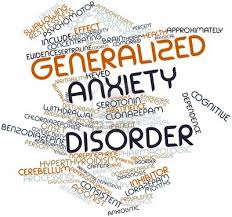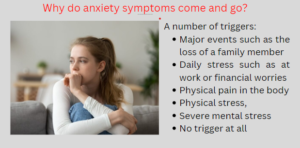
Anxiety is a part of normal human emotions. We all get anxious when we are going to see a doctor or are facing a crowd for the first time or are being separated from our loved ones. The anxiety helps you to adapt to the situation in fight-or-flight mechanism. Some people with anxiety disorders however get anxiety frequently. What causes anxiety disorders to develop?
The list of anxiety disorders is as elucidated in the DSM-5 chapter on anxiety disorders. There are also some related mental disorders which share symptoms, triggers, and treatment methodologies.
The causes or triggers for anxiety disorders and related mental disorders can either be similar or different according to the disorder.
Contents
What causes anxiety disorders to develop?
It is quite complicated to pinpoint the causes of an anxiety disorder. This is because anxiety disorders can be a result of one or several causes and triggers.
The causes of anxiety disorders can range from hereditary factors, environmental causes, mental conditions/ brain chemistry, physical diseases, and drug effects among others.
The causes and triggers can be different from one person to another even if they have the same anxiety disorder. In some people also, anxiety can develop without a reason to explain the trigger.
Discussing with a doctor about anxiety can help you in identifying the trigger or number of triggers that cause you to develop the anxiety. It is very important to know the triggers because this can be used to treat and manage your anxiety disorder.
Physical conditions/ health issues

Some diseases when diagnosed can cause serious anxiety and stress. This is because of the pain, restricted movement, the worry of death, cost of treatment, effects on the family, and how the public will perceive you/ stigma among other reasons.
Diseases like cancer, HIV/AIDS, heart attack, and other chronic diseases are supposedly what causes anxiety disorders to develop in some cases. In people who already have an anxiety disorder, the diagnosis may worsen the anxiety.
Also, some medical conditions may have anxiety as part of their symptoms. These conditions include hypoglycemia, heatstroke, and heart attack.
In those conditions, it is good to seek professional help from a doctor or a counselor. The doctor will help you to manage the emotions that are associated with the disease in addition to targeting the anxiety.
Also, for people with those diseases, it is good for them to practice home management of anxiety disorders. This enables one to be proactive and forge a positive look at life since those diseases can sap your energy.
Use of medications/ drugs

Some medication effects, side effects, and adverse reactions can trigger anxiety symptoms or potentiate an already existing anxiety disorder. These drugs may be prescription or over-the-counter medications that contain active ingredients that are supposedly what cause anxiety disorders to develop.
The effects of those drugs on the brain make one suffer from anxiety and also the effects on the body may worsen the anxiety.
In some cases, some drugs may cause effects that make you imagine the worst. One of our patients said that on taking one medication, she got adverse reactions that included painful teeth, palpitation, and severe headache. She thought she was dying thus bringing so much fear and worry.
The series of events in the body and mind led her to get a panic attack and this happens in several individuals.
Some of the medications that can trigger anxiety include:
- Colds, cough, and flu medications including decongestants
- Drugs prescribed for weight loss
- Medication used for birth control
- Use of attention deficit hyperactivity disorder (ADHD) medications containing stimulants like amphetamines, dexmethylphenidate, and lisdexamfetamine
- Medications containing caffeine such as headache and migraine medication
- Corticosteroids/ medications for asthma, allergies, bronchitis, and arthritis including cortisone, prednisone, and dexamethasone. Other asthma medications like theophylline, albuterol, and salmeterol.
- Medication for thyroid conditions like thyroid pills.
- Medications for Parkinson’s disease that contain levodopa and carbidopa
- Seizure drugs like phenytoin
When taking these drugs, it is important that you keep a check on the side effects. If you develop anxiety while taking these drugs, it is important to discuss them with your doctor. The doctor will advise on whether it is necessary to get an alternative or if the anxiety can be managed or will go away soon.
Genetics

Anxiety disorder can be hereditary. Most people whose families have a history of suffering from anxiety disorders have a higher risk of getting an anxiety disorder themselves.
In these people, if a family member has one type of anxiety disorder, they can suffer from the same type or different type of anxiety disorder.
Several studies have shown that some chromosomal characteristics and certain genes such as RBFOX1 and others are linked to the development of different types of anxiety disorders.
However, it should be noted that genetics and other medical/ environmental factors combine to cause anxiety disorders.
Environmental causes/ triggers
There are several things that an individual face every day that can cause anxiety. These may be related to situations a person goes through on a day-to-day basis for school, work, leisure, exercise, and so on. Some of the environmental triggers for anxiety include:
- Stress from a personal relationship like a spouse, family, or close friends. This may be as a result of conflict or because of fear about the future among others.
- Stress at work such as having to do public performances or events or fear about performance at work.
- Financial stress/ concerns
- Being in social events or parties with many strangers.
- Stress emanating from the school
- Trauma from the loss of a close friend, family member, or partner
- Visiting a place with low oxygen levels like high altitude areas
- Things that remind you of a traumatizing ordeal like smell, place, or song
- Excessive use of social media leads to feelings of anxiety, jealousy, rejection, humiliation, or abandonment
Most of these triggers can be effectively managed to get relief from anxiety. Some may require positive reinforcement from people close to you. In other conflict management skills may be necessary to reduce the impact of the trigger.
Seeking help from other professionals like a financial advisor may reduce the burden imposed on yourself from financial stress.
However, it is good to identify and discuss the cause of your anxiety with your doctor. This will help you to formulate an anxiety treatment plan suitable for you.
Mental conditions/ brain chemistry
The brain chemicals, function, and structure may be altered by exposure to several factors that cause anxiety. Such factors include traumatic conditions that happened to you or to someone while you were witnessing, stress, and genetic factors.
These changes affect the neurotransmitters production or use, brain chemicals receptors, and electric signals in the brain causing anxiety and mood disorders as defined in psychology.
In some people, the cause such as trauma may have happened in the past and the anxiety symptoms may take months or years to develop. This occurs in disorders like PTSD or panic disorder.
For this reason, most of the medications used to treat anxiety disorders work on brain function. The medications try to balance or alter the brain chemicals, signals, and function to a more normal level.
In other instances, like in stress, the doctor will help you on how to cope with stress which with time helps to heal the brain.
Substance abuse, use or withdrawal

The use of illicit drugs and other substances are supposedly what causes anxiety disorders to develop in some people. The same applies to the withdrawal from the use of illicit substances.
When both anxiety disorder and substance abuse occur together, a person is diagnosed with a dual diagnosis. Some of the substances that the use or withdrawal from can lead to anxiety disorders include:
- Cocaine
- Alcohol
- Marijuana
- Stimulant drugs like amphetamines, ephedrine, caffeine, ecstasy, methamphetamine, and bath salts (mephedrone) among others
It is important to note that some of the substances above are not illicit. The substances that are not illicit are advised to be taken in moderation.
All anxiety disorders can be caused by illicit substance use but GAD, panic disorder, and agoraphobia are some of the most diagnosed anxiety disorders in people who use illicit substances.
With dual-diagnosis, an individual suffers from more functional impairments. The individual is unable to perform at work and also in social environments.
Treating dual diagnosis (co-morbid) is a bit more challenging than treating a single diagnosis. There are however several guides that have been developed to treat dual diagnosis.
The treatment options available are medications, behavioral therapies, and learning how to cope with the co-morbid diagnosis.
Temperamental factors
Some persons have intrinsic factors that can lead to the easier development of anxiety disorders. Some of the temperamental factors include:
- Behavioral inhibition
- Negative affect
- Shyness in parents or children
- Social isolation
These factors are very important to understand especially when it comes to social anxiety disorder, selective autism, and separation anxiety disorders.
Other causes of anxiety disorders
Skipping meals: Skipping meals may lead to hypoglycemia (low blood sugars) in the body. Low blood sugars and an empty stomach can result in nervousness, shaking of the hands, and stomach rumbles.
These symptoms are supposedly what causes anxiety disorders to develop. To avoid this, it is important to take a balanced meal on a regular basis in addition to having a healthy snack in case you skip a meal.
List of anxiety disorders and their causes
There are several types of anxiety disorders. The triggers and causes of the disorders may be similar or varied. Let us explore in brief some of the causes of the most common anxiety disorders and related disorders.
The following is the list of anxiety disorders that are described in DSM-5:
- Generalized anxiety disorders
- Panic disorder
- Agoraphobia
- Separation anxiety disorder
- Specific phobias
- Social phobia/ social anxiety disorder
- Selective mutism
Other related emotional disorders include
- Obsessive-compulsive disorder
- Post-traumatic stress disorder
Generalized anxiety disorder (GAD)

Generalized anxiety disorder is a chronic anxiety disorder characterized by extreme fear and worry about a variety of events. The fear and worry must last for a minimum of six months for it to be defined as GAD.
GAD has no singular cause that has been identified. A combination of factors may be the cause of generalized anxiety disorder.
Generalized anxiety disorder can be caused by most of the causes above including:
- Substance abuse of tobacco, caffeine, alcohol, and illicit drugs. Most of these drugs heighten the feelings of worry, anxiety, and nervousness. With frequent use, the symptoms also appear more often leading to generalized anxiety disorders.
- Genetics: Some of us are genetically predisposed to the development of anxiety disorders including GAD. Having someone in the family who suffers from an anxiety disorder increases the risk of developing generalized anxiety disorder.
However, in most cases, the genetic composition leads to the development of GAD when combined with enabling factors like environmental factors, trauma, and others.
In addition, women are twice as likely to develop GAD as compared to men.
- Brain chemistry: The brain when the limbic system is affected can lead to GAD. People with generalized anxiety disorder present with elevated activity of the amygdala and also with increases in the volume of gray matter in some areas such as putamen. The changes in brain structure and function can be a result of exposure to trauma and childhood abuse.
- Environmental factors: Environmental factors including excessive social media use, relationships, work stress, school stress, experiencing trauma, and some learned behaviors among other environmental factors can cause GAD.
Panic disorder
Panic disorder is an anxiety disorder that is characterized by recurrent random excessive feelings of terror or fear. Most people when they experience a panic attack will think that they are experiencing a heart attack.
The causes of panic disorder are almost similar to those of generalized anxiety disorder including:
- Genetics: If a close family member has been diagnosed with an anxiety disorder, the risk of getting panic disorder increases. It has also been proven that women are twice as likely to get a panic disorder as compared to men.
- Physical conditions/ health issues: Some diseases increase the risk of getting a panic disorder. Illnesses of the endocrine system, cardiovascular system, and other serious medical conditions increase the risk of getting a panic disorder. This is because of the worry about your family, finances, life, pain, and others.
- Substance abuse: Abuse of several substances has been shown by several studies to contribute to the development of panic disorders. These substances include caffeine, cocaine, smoking, other stimulants, and alcohol.
- Environmental factors: Severe stress from the loss of a loved one, job loss, financial stress, and stress at school among others can cause panic disorder to develop. Other factors that may lead to the development of panic disorders include major changes in your life like a divorce, and the addition of a child among others.
- Brain chemistry: Factors that can alter the brain structure and function play a role in the development of panic disorders. The changes in brain chemistry can be due to prolonged physical, emotional, and sexual abuse during childhood. This may also be due to a serious accident or another traumatic event.
Agoraphobia
Agoraphobia is the fear of the fear. It is the intense fear of being in a situation or place where it is difficult to escape, is uncomfortable to escape, or where help when needed is unavailable. Agoraphobia can be with or without panic disorder.
The following are supposedly what cause anxiety disorders to develop, in this case, agoraphobia:
- Mental disorders like bulimia, depression, and anorexia nervosa. Also having other phobias like social phobia and fear of confined spaces (claustrophobia).
Other anxiety disorders and related disorders like generalized anxiety disorder, panic disorder, or obsessive-compulsive disorder can lead to the development of agoraphobia.
- Brain chemistry: changes in the brain function and structure from physical and sexual abuse can cause agoraphobia. Imbalances in the neurotransmitters can lead to a situation where the brain has increased stress response thus leading to agoraphobia.
- Environmental factors: these include factors like the death of a loved one, violent attacks, and others can cause agoraphobia. Others include being in an unhappy relationship or losing your job.
- Substance abuse: Abuse of substances like cocaine, alcohol, and marijuana can lead to the development of agoraphobia.
- Genetics: When you have a family history of anxiety disorders, then the risk of developing agoraphobia increases. Also due to a theory where some people are wired differently leading to the fears in a theory called “fear network”.
- Physical/ health condition: Having an illness that was as a result of being infected in public places and doing something accidentally while among other people brought about humiliation and embarrassment.
Separation anxiety disorder

Separation anxiety disorder is an inappropriate and excessive fear of being separated from a person or a place that you are attached to. Children will normally experience separation anxiety but if it is not excessive or inappropriate then that is normal.
Separation anxiety disorder can be caused by the following:
- Brain chemistry: The brain chemistry may change as a result of being abused as a child or being brought up by threatening parents. It may also be as a result of childhood adversity like the death of a close family member.
- Mental illnesses: These include other anxiety and related disorders like obsessive-compulsive disorder, panic disorder agoraphobia, and social phobias.
- Genetics: Genetics play a role in developing a separation anxiety disorder. This is seen since females have a higher risk of developing SepAD as compared to men.
- Environmental factors: Factors like divorce, your child going to college, or a child leaving home can cause separation anxiety disorder in an adult. This may result also from separation from another close person.
Persons with separation anxiety disorders are always termed as being overprotective. However, this may be a sign of separation anxiety in adults.
Specific Phobias
Specific Phobias are excessive and intense worry and fear about a certain object or situation that is way beyond what is appropriate for the actual threat involved. This situation or object is avoided in a dysfunctional way.
They are for example the fear of heights, flying, insects, snakes, darkness, and confinement in a small room among others. The exact causes of specific phobias are unknown, but research has pinpointed several things that have led to the phobias.
Some of the causes of specific phobias may include:
- Brain function/ chemistry: Experiencing trauma can cause the function and chemistry in the brain to be altered thus playing a role in the development of specific phobias.
Some people may also be more negative, sensitive, or reserved increasing the risk of getting a specific phobia.
- Environmental factors: Learned reaction from facing a frightening or threatening situation for example an animal attack or bite, near drowning, being stuck in an elevator, and being locked in a dark room can lead to the development of specific phobias.
Some people also learn about negative experiences like plane crashes, falls from tall buildings, snake bites either from news, from associates, or from movies leading to the development of phobias.
- Genetics: It has been shown that children born by parents with specific phobias or other anxiety disorders are more likely to develop a specific phobia.
- Mental disorders: people with mental disorders such as depression have a higher risk of developing specific phobias. Also, people with schizophrenia may experience phobias as part of their symptoms.
- Substance abuse: Some substances like hard drugs can lead to the development of phobias. Cocaine and marijuana are shown to bring about hallucinations, paranoia, and delusions which with continued use may lead to phobias.
This is a feeling of extreme fear and worry about being in a social situation where scrutiny, ridicule, or embarrassment is expected.
In this situation, you develop extreme fear that you will be ridiculed, judged, embarrassed, or scrutinized. Like in most anxiety disorders, the exact cause of the social phobia is unknown.
However, there are several things that have been shown to contribute to the development of social anxiety disorder. Some of the reasons why social anxiety disorder may develop include:
- Environmental causes: This may result from being abused (physically, emotionally, or sexually), bullied by agemates, having experienced family conflicts, divorce, losing a loved one, and maternal stress among others.
Being raised in a controlled environment or by an overprotective family can also lead to the development of a social phobia.
- Brain chemistry: Having an overactive amygdala and serotonin imbalance among other physical abnormalities may contribute to the development of social anxiety disorder in the brain. These changes can be caused by sustained trauma for example from abuse or sometimes from substance abuse.
- Genetics: Like in all other anxiety disorders, genetics may be one of the reasons for developing a social anxiety disorder. Having someone in your family suffering from an anxiety disorder may lead to the development of a social phobia.
However, some researches are trying to determine whether this is a result of learning from the other person or if it is genetically passed from the parents to the progenies.
Selective mutism

Selective mutism is a childhood anxiety disorder where a child who has the capability to speak is unable to speak in certain circumstances or to some individuals. Sometimes, the disorder can also affect adults who are also unable to speak.
The disorder is comorbid with social anxiety disorder, separations anxiety disorder, and specific phobias among other anxiety disorders.
The condition affects about 0.8% of the population at a time in their lives, thus it is a bit rare as compared to other anxiety disorders. For this reason, the causes are not well known.
Some of the causes/ triggers associated with the development of selective mutism include:
- Genetics: As discussed in all the other anxiety disorders, genetics play a role in the development of selective mutism. The disorder is more likely to be diagnosed in children whose parents suffer from an anxiety disorder.
It is also co-morbid with social anxiety thus implying that there might be a shared genetic component in the two disorders.
- Environmental factors: Children raised by a family where there are social inhibitions are likely to develop selective mutism as compared to the others. When parents are overprotective or want to exert a high degree of control over their children, it may be a risk to the development of selective mutism.
- Temperamental factors: In some children, some intrinsic factors may make it easier to develop selective mutism. Some of these factors may be exhibited by the parents or by the children. The temperamental factors may include shyness in parents, social isolation, behavioral inhibition, and negative affect.
Some children who have receptive language problems may develop selective mutism.
Boston anxiety treatment final word on causes of anxiety disorders
Anxiety disorders can greatly reduce the quality of life. It is important to know what causes anxiety disorders to develop. This is because it forms part of the ways to diagnose anxiety disorders and the subsequent treatment.
These ways are for different anxiety disorders as explained in the list of anxiety disorders.
The main causes of anxiety disorders are hereditary factors, environmental factors, medical factors, substance abuse, other mental disorders, and brain chemistry.


